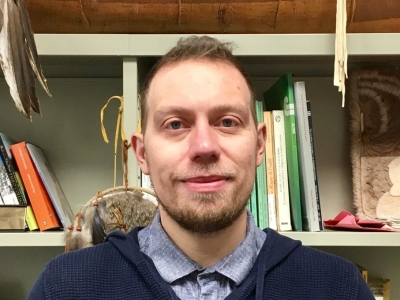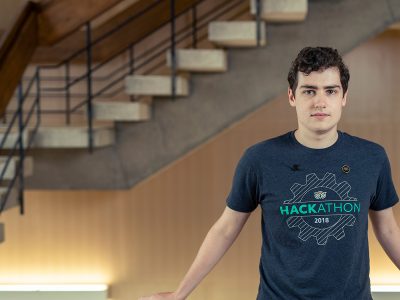By Joseph Mathieu
Photos by Fangliang Xu
As a child, TVO reporter Shelby Lisk heard very little of her family’s native language.
She was raised in Belleville, Ont. —not very far from Kenhtè:ke (Tyendinaga Mohawk Territory) but far enough to be disconnected.
“I grew up outside of my community, not learning a lot about my culture while I was growing up,” said the photographer, artist and writer.
“I entered my 20s not knowing who I was and craving that connection.”
Journalism, she discovered, was the tool she needed to reclaim her culture. As she developed her reporting skills, she wondered if her work would be published in Mohawk one day.
“My journalism teachers told me that that would never happen,” said Lisk. “But last month I got to send my writing teacher from college my first article from TVO in the Mohawk language.”
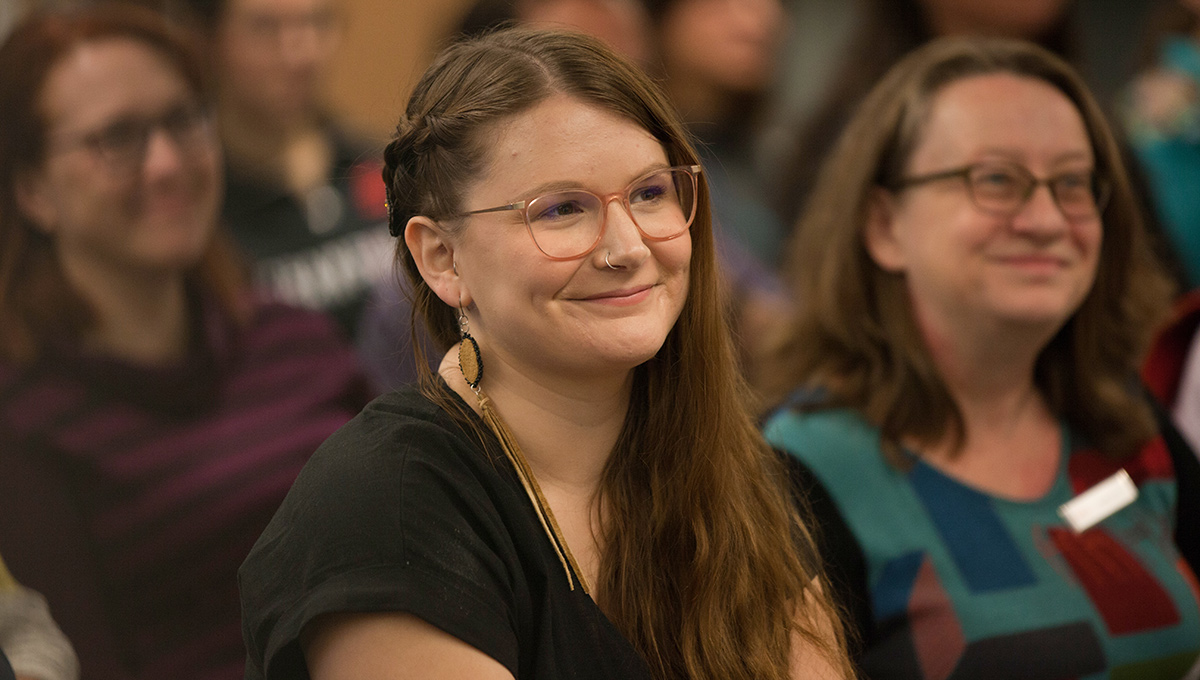
Shelby Lisk
Based at Carleton University and in partnership with its School of Journalism and Communication, the TVO Indigenous Hub celebrated its launch and Lisk’s debut as its embedded reporter on Nov. 29, 2019.
From the Carleton campus, Lisk will continue to write and broadcast Indigenous stories from across Ontario for TVO’s website and its flagship current affairs program, The Agenda with Steve Paikin. She will also be an important resource to the School’s journalism students as TVO’s journalist in residence.
“Shelby’s already made a difference in the education of our students,” said Susan Harada, interim director of the Journalism school.
“She’s made guest appearances in two of our courses [where] she helped guide students toward a clearer understanding of Indigenous perspectives and the work of journalists.”
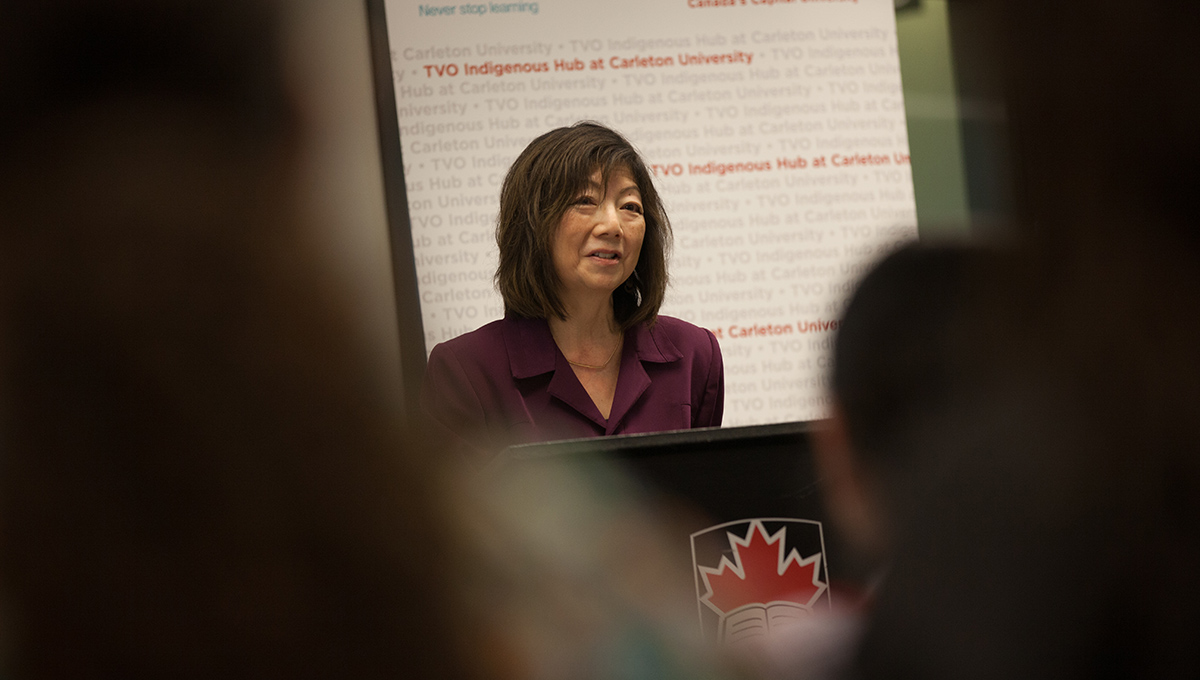
Recognizing the Strength of Canada’s Indigenous People
Lisk’s first article for TVO.org, about lessons in governance and democracy from the Haudenosaunee Confederacy, was the Ontario public broadcaster’s first story translated into an Indigenous language. Her stories will continue to be translated into the language relevant to the community she covers. Currently, TVO can translate their reporting into Ojibwe, Cree, Mohawk and Lunaapeew.
The celebration began with John Kelly, an Elder from Haida Gwaii who has taught journalism at Carleton for 20 years.
“For half that time, I was one of two Indigenous professors at the university,” he said.
“We are taking strong steps to change that, so our faculty representation reflects the needs of the students.”
Kelly introduced Lisk as a “high-calibre” reporter and said it was time for the country to recognize the strength of its Indigenous people.
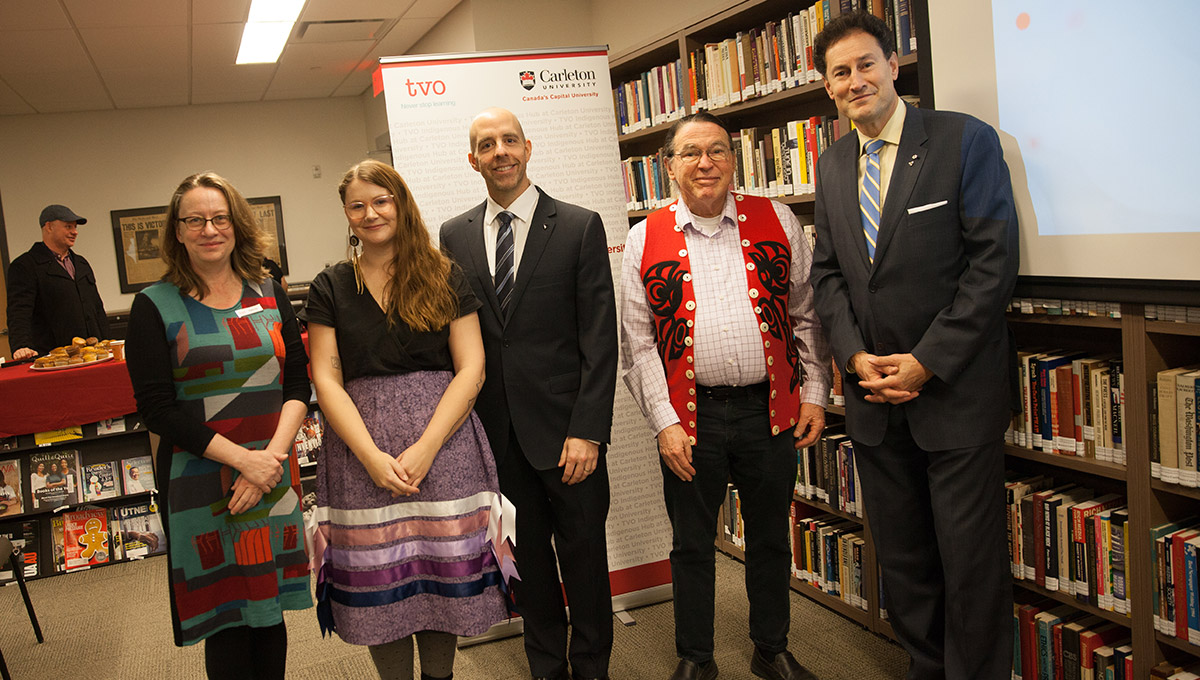
From left to right: Kathy Vey, Shelby Lisk, Benoit-Antoine Bacon, John Kelly and Steve Paikin
“It has already been four years since the final report of the Truth & Reconciliation Commission,” said Carleton President Benoit-Antoine Bacon. “There is legitimate fear that momentum could be lost at a time when positive change is just starting to emerge. At Carleton, we are trying to enact long-term positive change.”
Recently, the Carleton University Indigenous Strategic Initiatives Committee (CUISIC) posted a draft of 41 calls to action based on more than 40 consultation sessions on and off campus. CUISIC was tasked with developing a set of Carleton-specific recommendations as part of an institutional response to the TRC.
Harada said the entire Faculty of Public Affairs was aware of its obligations to the TRC, which tasked Canadian journalism programs with educating students on the history of Indigenous people. The TVO Indigenous Hub is one response; others include new courses and collaborations with the Department of History and the School of Indigenous and Canadian Studies.
TVO and Carleton, said Paikin, are well-aligned in their shared commitment to learning.
“As everyone in media knows, amplifying Ontario’s under-represented voices is getting harder and harder to do,” he said.
“The reality is we’re all living in an era of shrinking local media resources. It’s a bit scary. All the more reason why it is so important that we can give local Ontario stories the coverage and the analysis that they deserve.”
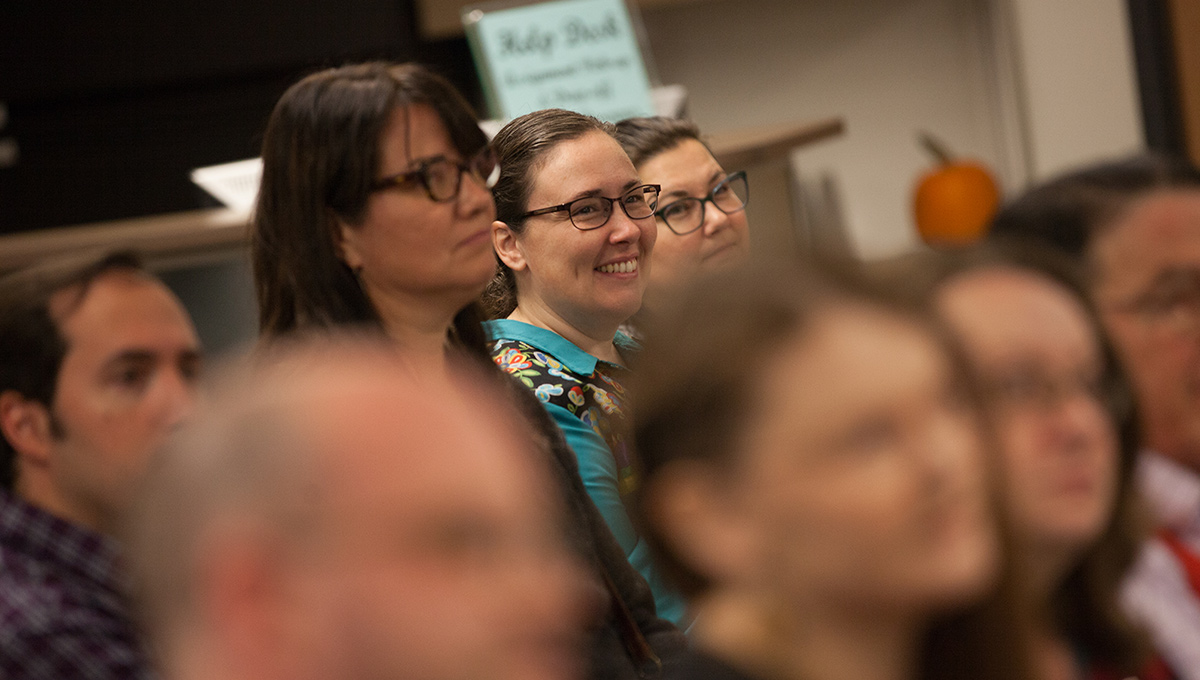
Indigenous Hub to Focus on Under-Represented Stories
TVO launched the Ontario Hubs project in September 2017 thanks to a $2-million donation from Barry and Laurie Green, and Barry’s mother Goldie Feldman, who wished to establish more in-depth current affairs coverage across the province.
Ontario Hubs are staffed by full-time journalists who cover a region of the province in partnerships with post-secondary institutions. These collaborations support embedded journalists with office and studio space, as well as access to academic experts and video transmission through the Ontario Research and Innovation Optical Network (ORION).
Since 2017, Jon Thompson has covered northwestern Ontario from Confederation College in Thunder Bay and Mary Baxter has covered southwestern Ontario in partnership with Western University in London. In 2018, hubs opened at Laurentian University in Sudbury and Queen’s University in Kingston as home bases for reporters Nick Dunne and David Rockne Corrigan, respectively.
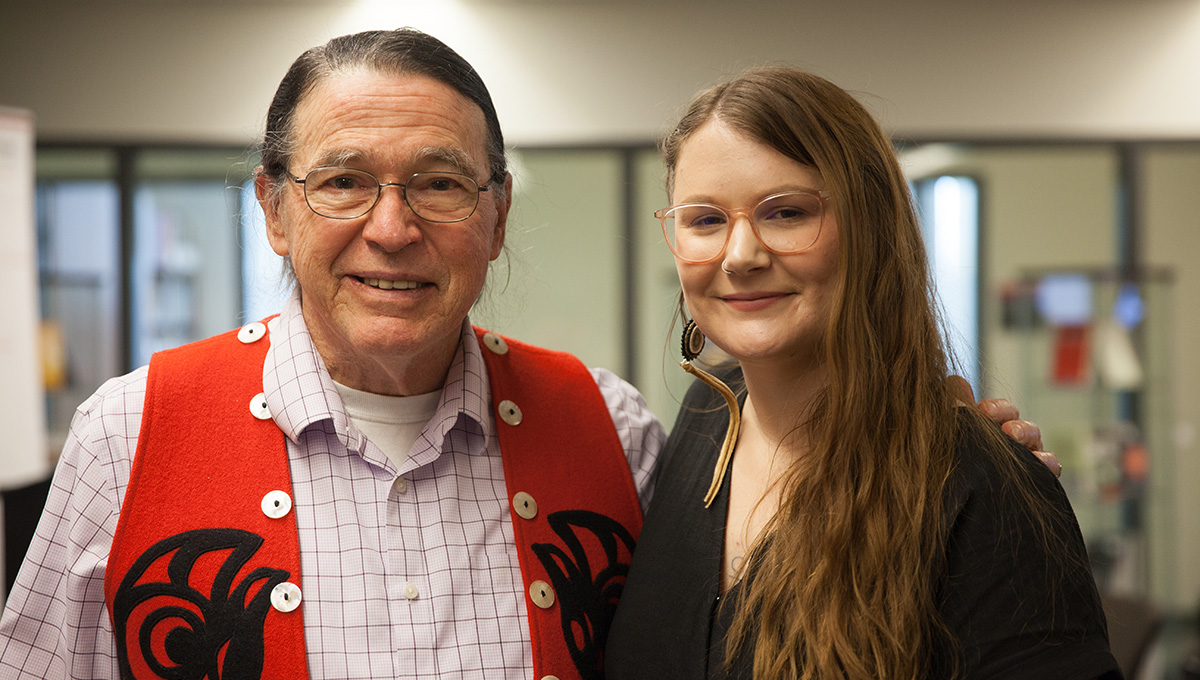
John Kelly and Shelby Lisk
According to TVO Executive Producer Kathy Vey, the TVO Indigenous Hub at Carleton will be a little different.
“Unlike our other hubs which we based on geographical regions, this hub will focus on the Indigenous peoples, issues and voices across Ontario,” said Vey.
“[These are] stories that until now have been under-represented in the media and which deserve our attention.”
The hub’s studio in Southam Hall to be operated by Carleton’s Teaching and Learning Services and will be used by Lisk, students, and media outlets seeking commentary from Carleton experts.
“I think that Indigenous people have so much to teach Ontarians, Canadians and the whole world about how to live in a good way on this land,” said Lisk, expressing gratitude to the people who share their stories with her.
Lisk hopes her work will bring settler Canadians and Indigenous people closer together and, most importantly, show younger Indigenous generations that their cultures are beautiful and important.
“I don’t want to ever again hear about another Indigenous child in Canada growing up ashamed of who they are.”
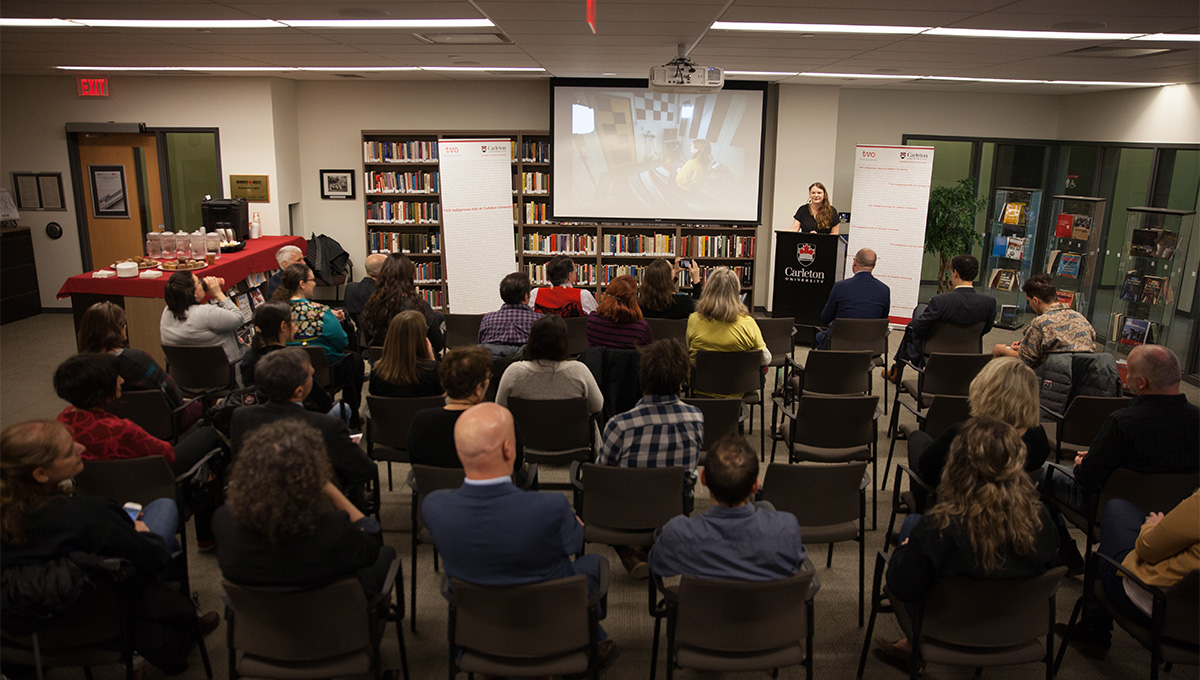
Monday, December 2, 2019 in Faculty of Public and Global Affairs, Indigenous, Journalism and Communication
Share: Twitter, Facebook

